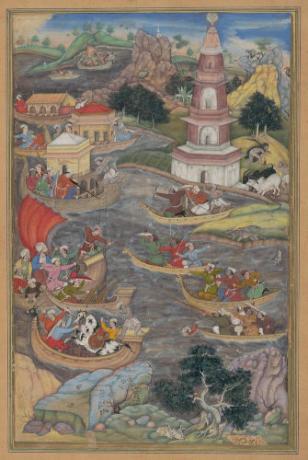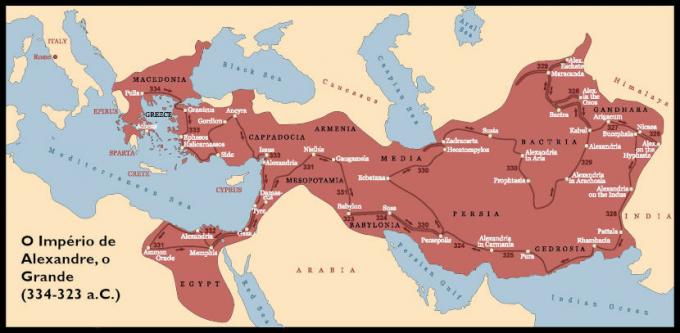Alexander, the Great became king of Macedonia after his father was assassinated in 336 BC. Ç. Over the next 13 years, he led a series of military campaigns that led the Macedonians to conquer the Persia, O Egypt and parts of India. He died in 323 BC. C., and the reasons of his death are unknown until today.
Accessalso: Creating Democracy in Athens
birth and youth
Alexander the Great aka alexandergreat, was born in the city of Pella, in the kingdom of Macedonia, probably on July 20, 356 BC. C., although there are doubts about this date. Alexander's father was Philip II, the king of Macedonia, and his mother was Olympia of Epirus, the fourth wife of the king.

As the son of the Macedonian king, Alexander received one of the best educations possible for a young man in the Greek world. As Macedonia claimed Greek origins for itself, Alexander was brought up according to the principles of that culture, with his father hiring big names to do so.
Alexandre was taught by a pedagogue called Lysimachus, who taught him about the importance of works of Greek culture, such as the Homeric poems. In the military arts, Alexandre was educated by Leonidas, a relative of Olympia and a person who taught him to be an austere man and to live with little, important characteristics in wars.
The most significant point in Alexander's formative period was the teaching he received from Aristotle, one of the great names in Greek philosophy. Aristotle taught him mathematics and philosophy. The Greek philosopher had a great influence on Alexander, with some contact between the two even after the tutoring period.
reign of Alexander the Great

In 336 a. Ç., Philip II was murderedand Alexander became king of Macedonia. Alexander had been groomed throughout his youth for this moment, yet his father's murder came as a big surprise, and a crisis broke out in Macedonia.
alexander needed to overcome opponents who tried to take away from him the possibility of being king. he faced a cousin and two brothers, sons of Philip II with other wives, who wanted their father's reign. In addition, Alexandre had to deal with some Greek city revolts and its peoples who tried to take advantage of the emperor's death.
All this happened between 336-334 a. Ç. From there, he began his famous military campaign in the Orient. For the next 11 years, Alexander was on military campaigns for most of them. His achievements during this period made him one of the best known names in history.
Also access:Alexander and the Macedonian empire – see its expansion
military feats
Alexander's military expeditions turned, at first, against the Persian Empire, and the starting point was the Asia Minor region (present-day Turkey). There, Alexander led troops to put an end to Persian influence. After the successful confrontation, he ordered the newly conquered cities to be transformed into democratic polis.
The victory in Asia Minor was achieved during the Battle of Granicus, still in 334 a. Ç. After that conquest, Alexander continued advancing, and, in 333 a. C., a crucial new battle took place. At Battle of It, the Macedonian king won an important victory against the Persians, paving the way for a series of conquests off the coast of Syria and Phoenicia. Darius, the Persian king, fled.

In this region, the place of greatest difficulty for Alexander was the city of Tyre, now Lebanon. There he needed a eight month siege to conquer the city. Alexander then went to Egypt, which he annexed to his empire, but granting the Egyptians some autonomy.
One of the most important achievements of Alexander's period in wars was the founding of alexandria, a coastal city on the Nile delta that served important military purposes for the Macedonians. Through this city, the emperor intended to protect the delta and prevent any surprise attack from coming that way. Alexandria became the most important city in the Greek world centuries later.
After Egypt, he resumed his campaign against Darius, the king of Persia, from 331 BC. Ç. That year was fought the third great battle between Macedonians and Persians, taking place this time in Gaugamela. In this clash, the Persians were defeated again and their king fled again, allowing Alexander to conquer three important cities: Babylon, Susa and Persepolis.
Alexander then started a hunt for Darius, but the Persian king was slain by Besso, a satrap (governor) of Bactriana. From 329 a. C., Besso and the regions he ruled (northeast of the Persian Empire) became Alexander's target. In the same year, Alexandre managed capture besso and, in the following year, 328 a. C., conquered the places that still resisted in the region.

The last stage of the conquests of Alexander began in 327 a. C., when he took his troops to the India. The battles in India were very tough, and it is said that, in them, Alexander almost died, in addition to having lost his horse, Bucephalus, which had accompanied him since his adolescence. Accounts deal with Alexander's great sadness at this loss.
After some conquests, Alexander's soldiers asked that they could return to Persia, and, from 326 a. a., the return of the emperor was organized. In 324 BC C., he arrived at Susa, where he arranged the marriage with his first wife, purple, a Persian woman. With her, Alexandre had a son, alexanderego.
Accessalso: Medical Wars - Persian Vs. greeks
Death
Both The last years of Alexander's life were lived in the territory of the former Persian Empire.. As we have seen, he married, in 324 BC. C., with Roxana, but also married two other women, Statira and Parisati. Between 324 a. Ç. and 323 a. C., Alexander's weddings were celebrated in different places, and he also had time for small military expeditions.
Meanwhile, the great emperor of Macedonia was making plans for a new military campaign, and his target was the Arabian Peninsula. However, in May 323 a. C., he had a badsudden, and about two weeks later, she passed away. Alexander's death was as sudden and sudden as the rise of his empire.
His death is a subject that generates debate among historians to this day. There is no conviction in what may have caused it, and the two most worked hypotheses are of malaria or a possible poisoning. Recently, a New Zealand doctor brought a new hypothesis to the debate, suggesting that the cause could have been the Guillain Barré Syndrome.
After her death, the Macedonian Empire, which extended to India, crumbled among Alexander's top generals. Two of his wives, Estatira and Parisátide, were killed, and it is believed that Roxana was responsible. Years later, in 310 BC C., one of Alexander's generals poisoned Roxana and her son, putting an end to the offspring of the most famous Macedonian king.

